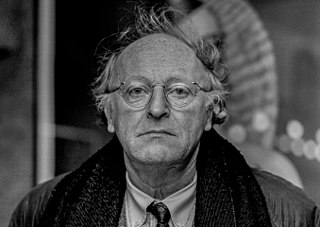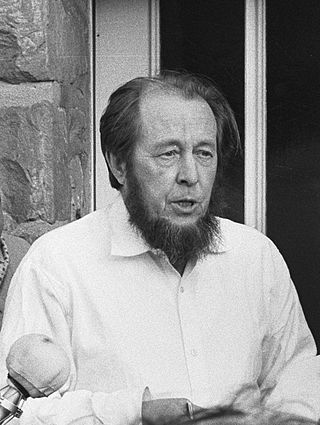
The Nobel Prizes are five separate prizes that, according to Alfred Nobel's will of 1895, are awarded to "those who, during the preceding year, have conferred the greatest benefit to humankind." Alfred Nobel was a Swedish chemist, engineer, and industrialist most famously known for the invention of dynamite. He died in 1896. In his will, he bequeathed all of his "remaining realisable assets" to be used to establish five prizes which became known as "Nobel Prizes". Nobel Prizes were first awarded in 1901.
1931 (MCMXXXI) was a common year starting on Thursday of the Gregorian calendar, the 1931st year of the Common Era (CE) and Anno Domini (AD) designations, the 931st year of the 2nd millennium, the 31st year of the 20th century, and the 2nd year of the 1930s decade.

Russian literature refers to the literature of Russia and its émigrés and to Russian-language literature. The roots of Russian literature can be traced to the Middle Ages, when epics and chronicles in Old East Slavic were composed. By the Age of Enlightenment, literature had grown in importance, and from the early 1830s, Russian literature underwent an astounding golden age in poetry, prose and drama. Romanticism permitted a flowering of poetic talent: Vasily Zhukovsky and later his protégé Alexander Pushkin came to the fore. Prose was flourishing as well. Mikhail Lermontov was one of the most important poets and novelists. The first great Russian novelist was Nikolai Gogol. Then came Ivan Turgenev, who mastered both short stories and novels. Fyodor Dostoevsky and Leo Tolstoy soon became internationally renowned. Other important figures of Russian realism were Ivan Goncharov, Mikhail Saltykov-Shchedrin and Nikolai Leskov. In the second half of the century Anton Chekhov excelled in short stories and became a leading dramatist. The beginning of the 20th century ranks as the Silver Age of Russian poetry. The poets most often associated with the "Silver Age" are Konstantin Balmont, Valery Bryusov, Alexander Blok, Anna Akhmatova, Nikolay Gumilyov, Sergei Yesenin, Vladimir Mayakovsky, and Marina Tsvetaeva. This era produced some first-rate novelists and short-story writers, such as Aleksandr Kuprin and Nobel Prize winners Ivan Bunin, Leonid Andreyev, Fyodor Sologub, Yevgeny Zamyatin, Alexander Belyaev, Andrei Bely and Maxim Gorky.

The Abel Prize is awarded annually by the King of Norway to one or more outstanding mathematicians. It is named after the Norwegian mathematician Niels Henrik Abel (1802–1829) and directly modeled after the Nobel Prizes. It comes with a monetary award of 7.5 million Norwegian kroner.

Mikhail Aleksandrovich Sholokhov was a Russian novelist and winner of the 1965 Nobel Prize in Literature. He is known for writing about life and fate of Don Cossacks during the Russian Revolution, the civil war and the period of collectivization, primarily in his most famous novel, And Quiet Flows the Don.

Iosif Aleksandrovich Brodsky was a Russian and American poet and essayist. Born in Leningrad, Soviet Union, in 1940, Brodsky ran afoul of Soviet authorities and was expelled from the Soviet Union in 1972, settling in the United States with the help of W. H. Auden and other supporters. He taught thereafter at Mount Holyoke College, and at universities including Yale, Columbia, Cambridge, and Michigan. Brodsky was awarded the 1987 Nobel Prize in Literature "for an all-embracing authorship, imbued with clarity of thought and poetic intensity". He was appointed United States Poet Laureate in 1991.

The Lenin Prize was one of the most prestigious awards of the Soviet Union for accomplishments relating to science, literature, arts, architecture, and technology. It was originally created on June 23, 1925, and awarded until 1934. During the period from 1935 to 1956, the Lenin Prize was not awarded, being replaced largely by the Stalin Prize. On August 15, 1956, it was reestablished, and continued to be awarded on every even-numbered year until 1990. The award ceremony was April 22, Vladimir Lenin's birthday.

And Quiet Flows the Don is a novel in four volumes by Russian writer Mikhail Sholokhov. The first three volumes were written from 1925 to 1932 and published in the Soviet magazine Oktyabr in 1928–1932, and the fourth volume was finished in 1940.

Dmitry Andreyevich Muratov is a Russian journalist, television presenter and the editor-in-chief of the Russian newspaper Novaya Gazeta. He was awarded the 2021 Nobel Peace Prize jointly with Maria Ressa for "their efforts to safeguard freedom of expression, which is a precondition for democracy and lasting peace."
Mikhail Mikhailovich Sholokhov was a Russian scientist. Candidate of Biological Sciences, Honorary Professor of Sholokhov Moscow State University for Humanities.

The 1970 Nobel Prize in Literature was awarded to the Russian novelist Aleksandr Solzhenitsyn (1918–2008) "for the ethical force with which he has pursued the indispensable traditions of Russian literature." For political reasons he would not receive the prize until 1974. Solzhenitsyn is the fourth Russian recipient of the prize after Ivan Bunin in 1933, Boris Pasternak in 1958 and Mikhail Sholokhov in 1965.

The 1965 Nobel Prize in Literature was awarded the Russian novelist Mikhail Sholokhov (1905–1984) "for the artistic power and integrity with which, in his epic of the Don, he has given expression to a historic phase in the life of the Russian people." He is the third Russian-speaking author to become the prize's recipient.









